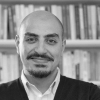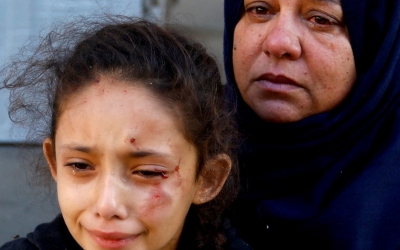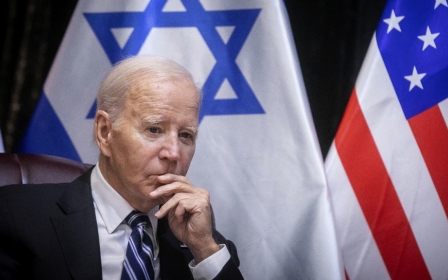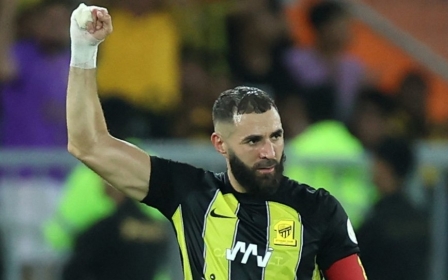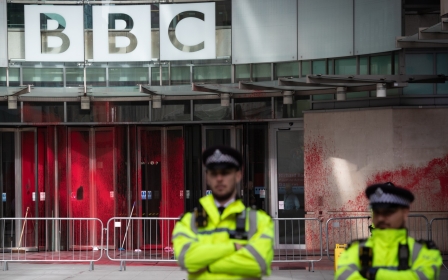Israel-Palestine war: Why France is happy to turn its Muslim and Jewish citizens against each other
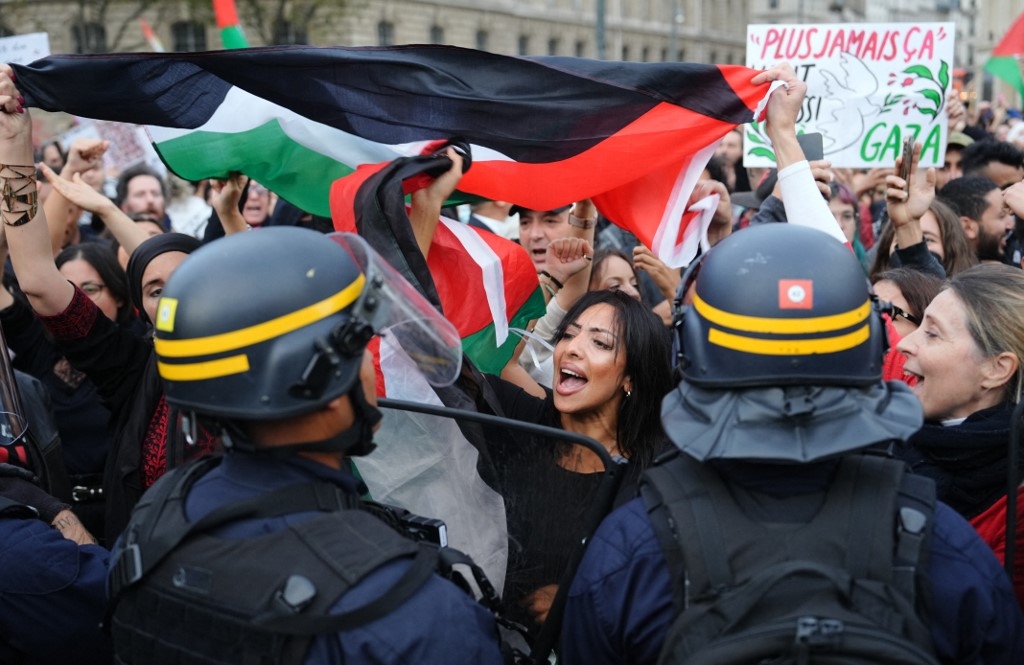
In France, there is massive popular support for the Palestinian cause. Tens of thousands of people understand colonisation and, despite the grossly one-sided media coverage of the massacres and human rights violations in Palestine, many read reports from the UN, Human Rights Watch and Amnesty International.
As a result, Israel's colonial policy and its far-right racist government programme are clearly understood as apartheid and ethnic cleansing.
Unsurprisingly, this support for Palestinians does not sit well with the current French government, whose stance against Muslims is now a constant source of international ridicule and concern. Meanwhile, President Emmanuel Macron's team is so desperate to secure the far-right vote that it has accused Marine Le Pen of being "too soft on Islam".
So the political framing of the Palestinian struggle for freedom is in part influenced by domestic biases against religious and ethno-cultural minorities, with most racist or ignorant media pundits projecting onto Palestinians any tropes they can conjure up from their anti-Arab and anti-Muslim playbook.
The problem is that some of these pundits are now ministers, and, in order to advance their ideological and political objectives, they use the French Republic's institutions and laws to criminalise and destroy any form of dissent.
New MEE newsletter: Jerusalem Dispatch
Sign up to get the latest insights and analysis on Israel-Palestine, alongside Turkey Unpacked and other MEE newsletters
In that sense, the tools and legal provisions used to demonise climate activists or pro-Palestinian organisations are the very same instruments that were designed to specifically target Muslims under the guise of "fighting separatism".
This is why activist Mariam Abudaqa, a long-time defender of Palestinian women's rights, who came legally to France for a series of conferences, was arrested this week and faces deportation.
This is why the French government is banning all demonstrations in support of Palestinians by labelling them as "pro-Hamas" and "public disorder" risks.
And this is why the minister of interior has announced his plan to disband several organisations by accusing them of "promoting Hamas explicitly or implicitly".
Dubious parallel
These measures could make the support for a human rights and international law-based pro-Palestinian movement a de-facto clandestine operation, with the government considering that "anti-Zionism is unquestionably a form of antisemitism" and that "the hate of the Jews meets the hate of the police", in a dubious parallel.
This marginalises France even further and adds to the pile of its violations of fundamental freedoms.
Follow Middle East Eye's live coverage for the latest on the Israel-Palestine war
But how did this "cafe-du-commerce" ignorant style rant become a defining and structural feature of the French government's foreign and domestic policy? How did we shift from Dominique de Villepin's historical 2003 speech at the UN opposing the invasion of Iraq, and Jacques Chirac's calling out of Israeli police harassment, to a full and unconditional endorsement of Israel's apartheid and ethnic cleansing programme?
Well, mainly for two reasons.
The first one is global: there has been a consistent effort from pro-Israeli groups and lobbies to push for the criminalisation of pro-Palestinian movements, from the adoption of a politically disputed and deliberately extensive definition of antisemitism to the targeting of Muslim and Arab organisations, used as proxies for the Palestinians' cause.
In this respect, France is just another space in this ongoing campaign, with no regard to what harm it may cause Muslims and Jews in France.
The second one is specific to France: the country collaborated with the Nazis willingly. Before the Nazis even asked, the French government implemented a series of measures that essentially removed Jews from civil service, before actually starting to confiscate Jewish property.
As historian Robert Paxton explained: "The Vichy French government participated willingly in the deportations and did most of the arresting... The arrest of foreign Jews often involved separating families from their children, sometimes in broad daylight, and it had a very powerful effect on public opinion."
Overall, the French authorities helped to deport 75,721 Jewish refugees and French citizens to death camps.
A toxic construction
From this history (back to Napoleon and even further), one can understand there is an ongoing, deeply rooted structural form of antisemitism in France, in which the government has always played a central role, from the Décret Crémieux (asking Jews to give away their identity as a condition for assimilation) to the Dreyfus affair.
This history has consequences on the short-term thinking of contemporary politicians: they have to prove they no longer share this vision of Jews as a political problem. Even when they actually do.
It usually means endorsing reversely racist views against Arabs and Muslims in a French political debate where the ongoing antisemitism is only partially hidden by an omnipresent form of Islamophobia, and where, in a toxic construction, some want to oppose French Muslims and Jews.
Instead of bringing people together, this tragic history is used by politicians to try and turn communities against one another and advance their own careers
The situation is made even more poisonous by the fact that the Jewish community in France has been the target of a series of killings and terrorist attacks from groups who identify as Islamist (which racists deliberately try to conflate with Muslims).
This is how Minister of Interior Gerald Darmanin can brush away serious accusations of antisemitism by endorsing the Israeli government's narrative.
Darmanin, who explained that "tens of thousands of Jews in France caused difficulties... and gave rise to troubles and complaints", feels compelled to give proof of his support for Israel.
He does this even if it adds to the confusion between the colonial state and French citizens of Jewish faith, while further criminalising support for Palestinians and Muslim-Arab communities in France.
Instead of bringing people together, this tragic history is used by politicians to try and turn communities against one another and advance their own careers, at the expense of their own citizens and the further weakening of France's credibility at an international level.
Meanwhile, the massacre of Palestinians in Gaza continues.
The views expressed in this article belong to the author and do not necessarily reflect the editorial policy of Middle East Eye.
This article is available in French on Middle East Eye French edition.
Middle East Eye delivers independent and unrivalled coverage and analysis of the Middle East, North Africa and beyond. To learn more about republishing this content and the associated fees, please fill out this form. More about MEE can be found here.


